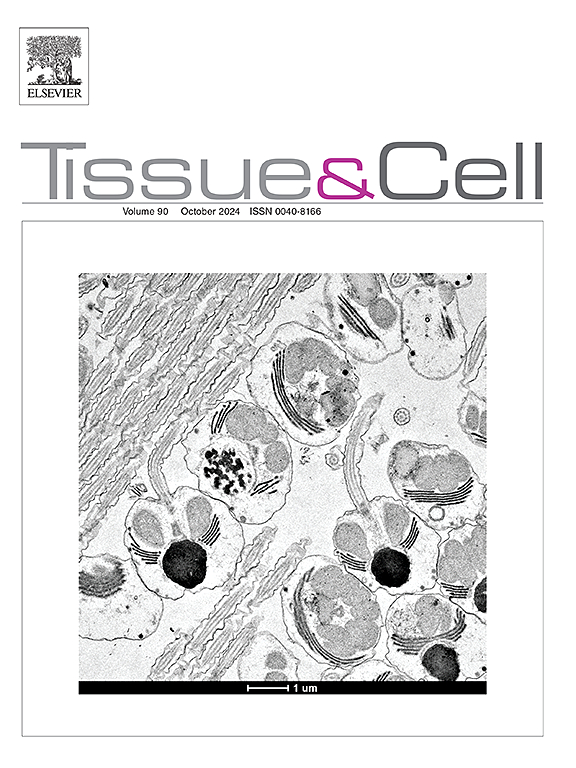The modulation of SHED-induced macrophage polarization and plasticity through paracrine mediators
IF 2.7
4区 生物学
Q1 ANATOMY & MORPHOLOGY
引用次数: 0
Abstract
Although the effect of stem cells from human exfoliated deciduous teeth (SHED) on macrophage polarization and plasticity has been studied in recent years, its mechanism needs to be elucidated. Here, we aimed to investigate how SHED-MSCs cross-talk with THP-1 cell-derived macrophages in a co-culture system. SHED- MSCs were indirectly co-cultured with polarized M0 and M1 macrophages using the six-well transwell culture system, and their effects on macrophage plasticity, surface molecule expression, cytokine secretion, oxidative stress indexes, and gene expression were evaluated. Using flow cytometry, we confirmed macrophage polarization and observed a significant shift toward the M2 phenotype (CD206) following co-culture with SHED-MSCs. Cytokine analysis revealed increased levels of anti-inflammatory factors (TGFB2, IL-10) and reduced pro-inflammatory cytokines (TNF-α, IL-12). Importantly, SHED-MSCs modulated the oxidative state of macrophages, significantly reducing Nitric oxide (NO) and Malondialdehyde (MDA) levels while enhancing antioxidant markers including Total antioxidant capacity (TAC), Superoxide dismutase (SOD), and Catalase (CAT). Gene expression analysis further supported this regulatory effect, with upregulation of ARG1 (Arginase 1 gene) and downregulation of IL-6R (Interleukin 6 receptor gene) in treated macrophages. our findings show that SHED-MSCs exert potent paracrine effects that not only reprogram inflammatory macrophages toward a reparative phenotype but also restore redox homeostasis. These results highlight the potential of SHED-MSCs as a therapeutic cell source for the treatment of inflammation- and oxidative stress–related diseases.
旁分泌介质对shed诱导的巨噬细胞极化和可塑性的调节
虽然近年来研究了人脱落乳牙干细胞(SHED)对巨噬细胞极化和可塑性的影响,但其机制尚待阐明。在这里,我们旨在研究shd - mscs如何在共培养系统中与THP-1细胞来源的巨噬细胞进行串扰。采用六孔transwell培养系统间接共培养SHED- MSCs,观察其对巨噬细胞可塑性、表面分子表达、细胞因子分泌、氧化应激指标及基因表达的影响。通过流式细胞术,我们证实了巨噬细胞极化,并观察到与SHED-MSCs共培养后巨噬细胞向M2表型(CD206)的显著转变。细胞因子分析显示抗炎因子(TGFB2, IL-10)水平升高,促炎因子(TNF-α, IL-12)水平降低。重要的是,shd - mscs调节了巨噬细胞的氧化状态,显著降低了一氧化氮(NO)和丙二醛(MDA)水平,同时提高了抗氧化标志物,包括总抗氧化能力(TAC)、超氧化物歧化酶(SOD)和过氧化氢酶(CAT)。基因表达分析进一步支持了这种调节作用,在处理后的巨噬细胞中,ARG1(精氨酸酶1基因)上调,IL-6R(白细胞介素6受体基因)下调。我们的研究结果表明,SHED-MSCs具有强大的旁分泌作用,不仅可以将炎性巨噬细胞重编程为修复表型,还可以恢复氧化还原稳态。这些结果突出了SHED-MSCs作为治疗炎症和氧化应激相关疾病的治疗性细胞来源的潜力。
本文章由计算机程序翻译,如有差异,请以英文原文为准。
求助全文
约1分钟内获得全文
求助全文
来源期刊

Tissue & cell
医学-解剖学与形态学
CiteScore
3.90
自引率
0.00%
发文量
234
期刊介绍:
Tissue and Cell is devoted to original research on the organization of cells, subcellular and extracellular components at all levels, including the grouping and interrelations of cells in tissues and organs. The journal encourages submission of ultrastructural studies that provide novel insights into structure, function and physiology of cells and tissues, in health and disease. Bioengineering and stem cells studies focused on the description of morphological and/or histological data are also welcomed.
Studies investigating the effect of compounds and/or substances on structure of cells and tissues are generally outside the scope of this journal. For consideration, studies should contain a clear rationale on the use of (a) given substance(s), have a compelling morphological and structural focus and present novel incremental findings from previous literature.
 求助内容:
求助内容: 应助结果提醒方式:
应助结果提醒方式:


